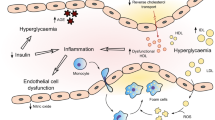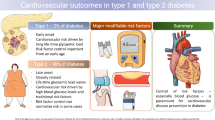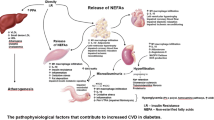Abstract
Type 2 diabetes increases the risk of cardiovascular disease (CVD) from two- to four-fold. In our large Finnish population-based study published in 1998 subjects with medication for type 2 diabetes had as high a risk of fatal and nonfatal myocardial infarction (MI) during the 7- year follow-up as non-diabetic subjects with a prior MI, suggesting that type 2 diabetes is a CVD equivalent. In another large study, including all 3.3 million residents of Denmark, subjects requiring glucose-lowering therapy exhibited a CVD risk similar to that of non-diabetic subjects with a prior MI. Subsequent studies have not systematically replicated aforementioned results. Some studies have supported the concept that type 2 diabetes is a CVD equivalent only in some subgroups, and many studies have reported negative findings. This is likely to be due to many differences across the studies published, for example ethnicity, gender, age and other demographic factors of the populations involved, study design, validation of diabetes status and CVD events, statistical analyses (adjustments for confounding factors), duration of diabetes, and treatment of hyperglycemia among diabetic participants. Varying results reflect the fact that not all diabetic patients are at a similar risk for CVD. Therefore, CVD risk assessment and the tailoring of preventive measures should be done individually, taking into consideration each patient’s long-term risk of developing cardiovascular events.
Similar content being viewed by others
References
Papers of particular interest, published recently, have been highlighted as:•Of importance
Pyörälä K, Laakso M, Uusitupa M. Diabetes and atherosclerosis: an epidemiological view. Diabetes Metab Rev. 1987;3:463–524.
Bornfeldt KE, Tabas I. Insulin resistance, hyperglycemia, and atherosclerosis. Cell Metab. 2011;14:575–85.
Haffner SM, Lehto S, Rönnemaa T, Pyörälä K, Laakso M. Mortality from coronary heart disease in subjects with type 2 diabetes and in nondiabetic subjects with and without prior myocardial infarction. N Engl J Med. 1998;339:229–34.
Juutilainen A, Lehto S, Rönnemaa T, Pyörälä K, Laakso M. Type 2 diabetes as a "coronary heart disease equivalent": an 18-year prospective population-based study in Finnish subjects. Diabetes Care. 2005;28:2901–7.
Bulugahapitiya U, Siyambalapitiya S, Sithole J, Idris I. Is diabetes a coronary risk equivalent? Systematic review and meta-analysis. Diabet Med. 2009;26:142–8.
• Schramm TK, Gislason GH, Køber L, et al. Diabetes patients requiring glucose-lowering therapy and nondiabetics with a prior myocardial infarction carry the same cardiovascular risk: a population study of 3.3 million people. Circulation. 2008;117:1945–54. A landmark study including all 3.3 million Danes at least 30 years of age requiring glucose-lowering therapy.
Whiteley L, Padmanabhan S, Hole D, Isles C. Should diabetes be considered a coronary heart disease risk equivalent? Results from 25 years of follow-up in the Renfrew and Paisley survey. Diabetes Care. 2005;28:1588–93.
Carnethon MR, Biggs ML, Barzilay J, et al. Diabetes and coronary heart disease as risk factors for mortality in older adults. Am J Med. 2010;123:556.e1-9.
Ho JE, Paultre F, Mosca L. Women's Pooling Project. Is diabetes mellitus a cardiovascular disease risk equivalent for fatal stroke in women? Data from the Women's Pooling Project. Stroke. 2003;34:2812–6.
• Wannamethee SG, Shaper AG, Whincup PH, et al. Impact of diabetes on cardiovascular disease risk and all-cause mortality in older men: influence of age at onset, diabetes duration, and established and novel risk factors. Arch Intern Med 2011;171:404–410. In this 9-year population-based follow-up study of 4 045 men, both early and late onset of diabetes were associated with increased risk of major CHD events during a 9-year follow-up, but only patients with early-onset diabetes diagnosed before the age of 60 years were at a CHD risk which was equivalent to that of non-diabetic subjects with a prior MI. This study suggests that a longer duration of diabetes (a longer exposure to chronic hyperglycemia) is needed to increase the risk related to the diabetic state toward a CHD risk equivalent.
Howard BV, Best LG, Galloway JM, et al. Coronary heart disease risk equivalence in diabetes depends on concomitant risk factors. Diabetes Care. 2006;29:391–7.
Hadaegh F, Fahimfar N, Khalili D, et al. New and known type 2 diabetes as coronary heart disease equivalent: results from 7.6 year follow up in a Middle East population. Cardiovasc Diabetol. 2010;9:84.
Becker A, Bos G, de Vegt F, Kostense PJ, Dekker JM, Nijpels G, Heine RJ, Bouter LM, Stehouwer CD. Cardiovascular events in type 2 diabetes: comparison with nondiabetic individuals without and with prior cardiovascular disease. 10-year follow-up of the Hoorn Study. Eur Heart J. 2003;24:1406–13.
Hu G, Jousilahti P, Qiao Q, et al. The gender-specific impact of diabetes and myocardial infarction at baseline and during follow-up on mortality from all causes and coronary heart disease. J Am Coll Cardiol. 2005;45:1413–8.
González-Clemente JM, Palma S, Arroyo J, et al. Is diabetes mellitus a coronary heart disease equivalent? Results of a meta-analysis of prospective studies. Rev Esp Cardiol. 2007;60(11):1167–76.
Wannamethee SG, Shaper AG, Lennon L. Cardiovascular disease incidence and mortality in older men with diabetes and in men with coronary heart disease. Heart. 2004;90:1398–403.
Cano JF, Baena-Diez JM, Franch J, et al. REGICOR and GEDAPS Investigators. Long-term cardiovascular risk in type 2 diabetic compared with nondiabetic first acute myocardial infarction patients: a population-based cohort study in southern Europe. Diabetes Care. 2010;33:2004–9.
Laakso M, Kuusisto J. Understanding patient needs. Diabetology for cardiologists. European Heart Journal Supplements. 2003;5 (Suppl B), B5-B13.
Kuusisto J, Mykkänen L, Pyörälä K, Laakso M. NIDDM and its metabolic control predict coronary heart disease in elderly subjects. Diabetes. 1994;43:960–7.
ACCORD Study Group, Gerstein HC, Miller ME, Genuth S, Ismail-Beigi F, Buse JB, Goff DC Jr, Probstfield JL, Cushman WC, Ginsberg HN, Bigger JT, Grimm RH Jr, Byington RP, Rosenberg YD, Friedewald WT. Long-term effects of intensive glucose lowering on cardiovascular outcomes. N Engl J Med 2011;364:818–828.
Haffner SM, Stern MP, Hazuda HP, Mitchell BD, Patterson JK. Cardiovascular risk factors in confirmed prediabetic individuals. Does the clock for coronary heart disease start ticking before the onset of clinical diabetes? JAMA. 1990;263:2893–8.
Saely CH, Aczel S, Koch L, Schmid F, Marte T, Huber K, Drexel H. Diabetes as a coronary artery disease risk equivalent: before a change of paradigm? Eur J Cardiovasc Prev Rehabil. 2010;17:94–9.
Silva JA, Escobar A, Collins TJ, Ramee SR, White CJ. Unstable angina. A comparison of angioscopic findings between diabetic and nondiabetic patients. Circulation. 1995;92:1731–6.
Sari I, Soydinc S, Davutoglu V, et al. Uncomplicated diabetes mellitus is equivalent for coronary artery disease: new support from novel angiographic myocardial perfusion-myocardial blush. Int J Cardiol. 2008;127:262–5.
Murarka S, Movahed MR. Diabetic cardiomyopathy. J Card Fail. 2010;16:971–9.
Asbun J, Villarreal FJ. The pathogenesis of myocardial fibrosis in the setting of diabetic cardiomyopathy. J Am Coll Cardiol. 2006;47:693–700.
Disclosure
No potential conflicts of interest relevant to this article were reported.
Author information
Authors and Affiliations
Corresponding author
Additional information
This article is part of the Topical Collection on Diabetes and Cardiovascular Disease
Volume 15, Issue 1
Rights and permissions
About this article
Cite this article
Kuusisto, J., Laakso, M. Update on Type 2 Diabetes as a Cardiovascular Disease Risk Equivalent. Curr Cardiol Rep 15, 331 (2013). https://doi.org/10.1007/s11886-012-0331-5
Published:
DOI: https://doi.org/10.1007/s11886-012-0331-5




